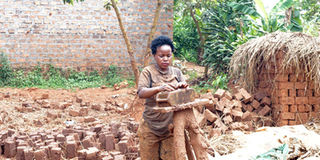To buy or bake your own bricks?

Very many people want their bricks baked on site though it has its pros and cons. PHOTO/KELVIN ATUHAIRE
What you need to know:
- Before obtaining bricks for house construction, one has to determine the amount required to accomplish the project at hand.
- Whether baked on site, bricks are an essential element in house construction hence a need to be critical on how to obtain them for quality work
Buying already manufactured bricks seems like a walk in the park.
Then there is baking on site; for many, it is affordable and flexible; you can adjust the number of bricks needed since everything happens on site. However, regardless of the choice one makes, you may need these guidelines.
The cost
Brick making entails processes including soil molding, drying and burning.
Ronald Sekandi, a resident of Lukuli Nanganda says he made his own bricks; he made 10,000 bricks while building his three bedroomed house.
Much as it is tedious, Sekandi says making his own bricks was cost saving compared to what he may have spent if he had to buy and transport them.
Bricks are priced differently, for instance, those made out of soil molds are sold at Shs250 each while clay ones cost between Shs350 to Shs400.
10,000 soil bricks will cost Shs2,500,000 while clay bricks, between Shs3,500,000-Shs4,000,000.
To make 10,000 bricks on-site, Sekandi bought firewood at 350,000 and paid 1,000,000 for the workforce as each brick costs Shs100 labour.
He paid Shs. 60, 000 water bill and spent Shs.100,000 for polythene materials he used to protect the raw bricks from direct sunshine.
His total expenditure was Shs1,510, 000, almost a million less than he would have spent had he bought the bricks.
Commitment and time
Making bricks is a tedious process which needs a lot of commitment and time.
Wet bricks are so delicate yet they require to be constantly turned over for complete drying.
They ought to be protected from extreme weather conditions such as too much sunshine and rainfall hence a need for maximum commitment.
If not handled well, bricks can break, leading to losses. Once they are dry, more caution has to be applied while they are in the furnace to make sure they are not over burnt or half-baked.
Meanwhile, Baker Mwesigwa, a construction engineer at Baker Constructions advises that if you are to mold bricks on- site, you should aim for the best output. He says over burnt bricks become brittle and can easily break while semi-burnt ones have low adhesiveness to cement and can easily absorb moisture which may lead to collapsing of walls where they are used.
“Making bricks on-site is pocket friendly, however you should be cautious to avoid mistakes, once the bricks do not turn out well, obviously it will be your loss,” he says.
Quantity
Before obtaining bricks for house construction, one has to determine the amount required to accomplish the project at hand.
Making bricks on- site means an increase in quantity hence an advantage because excess bricks can be used for other projects such as building pet houses, fences or even sold for money.
But if one opts to acquire bricks from manufacturers, construction is limited to the number of bricks he can afford.
For small construction projects, it would be better to only buy bricks and save time.
Serina Mugisha, a resident of Rubaga, only needed at least 500 bricks to fence her home but decided to buy material and locally make them at home.
To her disappointment, she spent more on labour and transport.
“Maybe making our own bricks is not for us who do small projects,” she said.
Weather conditions
The rainy season renders brick making troublesome as bricks will take more time to dry and may be destroyed.
In the rainy season, bricks cannot thoroughly dry and according to Mwesigwa, once burnt, half dried bricks can easily be broken by fire, and if they survive they will easily absorb water once used in construction.
Mwesigwa advises that on-site brick making should be done during the dry season to allow bricks dry faster and with the help of a professional builder.




